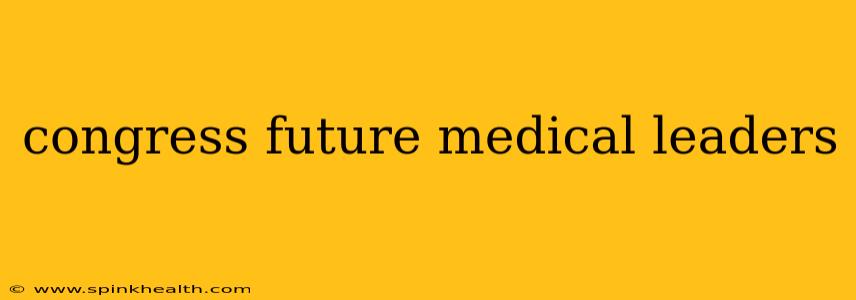The world of medicine is constantly evolving, a dynamic landscape shaped by technological advancements, shifting demographics, and evolving healthcare needs. At the heart of this evolution lies the crucial role of leadership, and the future of Congress's influence on medical innovation and policy is inextricably linked to the leaders who navigate this complex terrain. This journey into the future of medical leadership and its interplay with Congress isn't just about policy; it's about the stories of individuals, the challenges they face, and the impact they'll have on shaping healthcare for generations to come.
What Role Does Congress Play in the Future of Medicine?
Congress plays a pivotal role in shaping the future of medicine in the United States. Its legislative power directly impacts funding for medical research, the development and regulation of new drugs and technologies, and the overall structure of the healthcare system. From landmark bills impacting the Affordable Care Act to the ongoing debates surrounding healthcare access and affordability, Congress sets the stage for how healthcare is delivered and accessed across the nation. Their decisions influence everything from the availability of cutting-edge treatments to the accessibility of basic care for vulnerable populations. Therefore, understanding the interplay between Congress and medical leadership is crucial to understanding the future trajectory of healthcare.
How Can Medical Professionals Influence Congressional Policy?
Medical professionals, through various avenues, possess significant power to influence Congressional policy. They can participate directly through lobbying efforts, advocating for specific legislation that aligns with their professional expertise and the needs of their patients. Furthermore, they can contribute indirectly by engaging in public education campaigns, raising awareness among voters about crucial healthcare issues and advocating for policies that reflect the needs of the medical community. Building strong relationships with Congressional representatives and their staff, sharing data-driven evidence to support policy proposals, and active participation in the political process, all prove to be effective ways to shape the future of healthcare policy.
What are the Biggest Challenges Facing Future Medical Leaders?
Future medical leaders face a myriad of complex challenges, ranging from navigating the ever-changing technological landscape to addressing persistent issues of healthcare inequality and access. The integration of artificial intelligence (AI) and machine learning into healthcare presents both opportunities and ethical dilemmas that require careful consideration. Further, the rising costs of healthcare and the need for sustainable healthcare financing models necessitate innovative approaches to resource allocation and policy development. Finally, fostering effective collaboration among healthcare professionals across different disciplines and specialties will be paramount in delivering integrated patient care. Addressing these challenges effectively will require visionary leadership, adaptability, and a commitment to collaboration.
What Qualities Will Future Medical Leaders Need to Succeed?
The future of medicine demands leaders with a unique blend of qualities. Strong leadership abilities are essential to manage complex teams and guide organizations through challenging times. A deep understanding of healthcare policy is crucial, as leaders must navigate complex regulations and advocate for changes that improve patient care. Furthermore, a commitment to ethical practice and social responsibility is paramount in ensuring equitable access to healthcare for all populations. Crucially, adaptability and innovation will be key in responding to the ever-evolving nature of medicine and healthcare technology. The capacity for effective communication and collaboration, bridging the gap between medical professionals, policymakers, and the public, will be indispensable.
How Can Congress Support the Development of Future Medical Leaders?
Congress can play a pivotal role in nurturing future medical leaders by investing in medical education and training programs. This support might include increasing funding for medical schools and residency programs, providing scholarships and grants for students from underrepresented backgrounds, and supporting innovative educational approaches that incorporate interprofessional education and technology integration. Furthermore, Congress can create opportunities for mentorship and leadership development programs, connecting promising medical professionals with experienced leaders in the field and in policymaking. This proactive investment in human capital will pave the way for a new generation of leaders who are both scientifically proficient and adept at navigating the complexities of the political and regulatory landscape. This investment is not only about developing great doctors but also about fostering effective communication and collaboration between the medical community and policymakers, ultimately leading to better healthcare outcomes for all.

